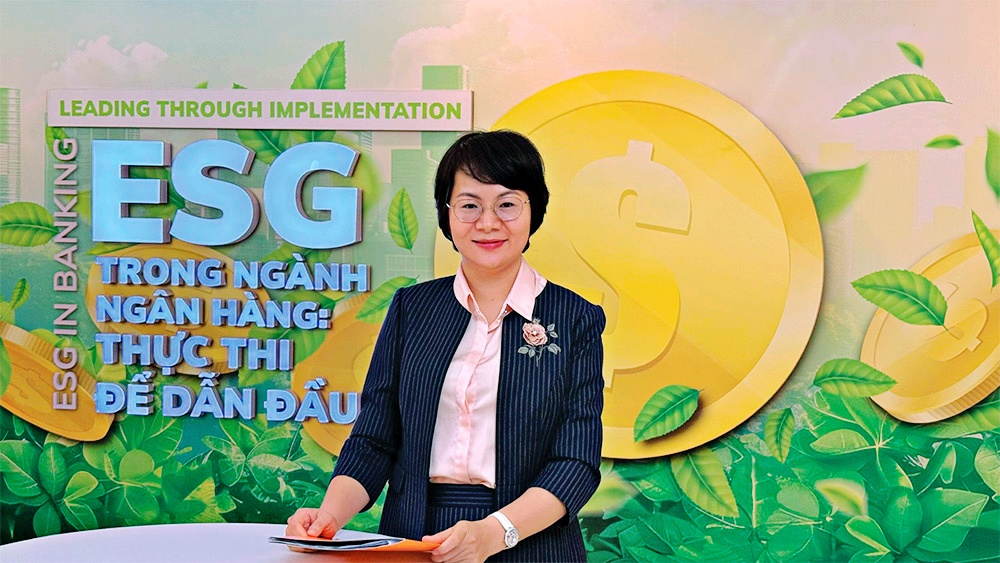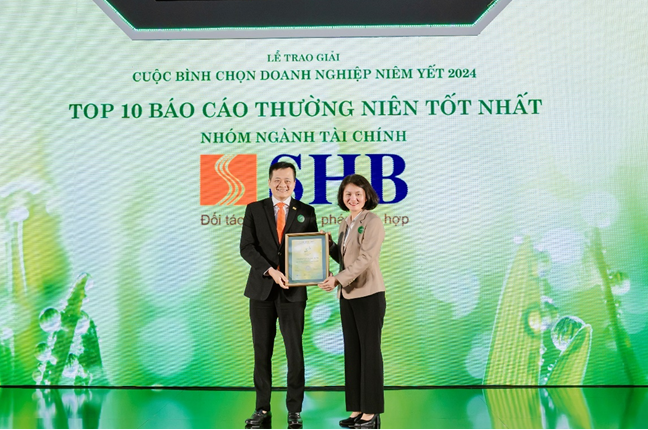Integration of ESG criteria at SHB propels bank forward
For example, major European banks such as BNP Paribas and Deutsche Bank have been actively promoting ESG by establishing sustainable finance funds and adopting strict environmental standards. Europe has also introduced the EU Taxonomy, a legal framework for classifying these economic activities. This helps banks identify and report transparently on their ESG activities.
 |
| Nguyen Thi Tuyet Hanh, director, International Project Management Department Saigon-Hanoi Commercial Joint Stock Bank (SHB) |
In Asia, Singapore’s DBS Bank has implemented many related initiatives through financing green projects and designing sustainable financial products. Japan, through major banks such as Mizuho and Sumitomo Mitsui, has developed financing policies based on climate and risk management.
In the US, banks such as Bank of America and JPMorgan Chase have invested heavily in renewable energy and built socially responsible investment funds. This not only creates economic profits but also helps enhance reputation and trust from customers and investors.
In Vietnam, implementing ESG brings many opportunities for local commercial banks, including attracting investment capital and increasing brand reputation. However, it also poses challenges related to initial investment costs, regulatory changes, and strict governance requirements from international investors and partners. Banks need to have specific strategies to take advantage of opportunities and minimise potential risks.
Among these, SHB aims to become a pioneer bank in sustainable development in Vietnam, integrating ESG standards into all practical activities, contributing to promoting a green economy, fair society and transparent governance.
For three decades, SHB has been steadfast in its ethical qualities and specific actions based on its core values, which are the foundation for the bank’s brand philosophy and corporate culture sent to shareholders, partners, customers, employees, and the community. As a pioneer in sustainable finance, SHB integrates ESG principles into its strategy, striving to become the leading bank in efficiency and the top retail bank.
Simultaneously, SHB aims to lead in providing capital and financial services to strategic enterprises with supply chains, value chains, and green ecosystems, fostering economic growth, environmental responsibility, and social equity, while ensuring transparent governance to create long-term value for all stakeholders.
Innovative programmes
Since 2003, SHB has participated in internationally funded projects promoting sustainable development in Vietnam across various fields such as renewable energy, efficient power transmission, sustainable agriculture, high-tech agriculture, and rural development. These initiatives, with a total value reaching billions of dollars, were funded by international development organisations and multilateral institutions.
Meanwhile, SHB consistently leads in the efficiency and effectiveness of project implementation. In 2023, it was selected as the risk-sharing fund manager for the Vietnam Scale-Up Energy Efficiency Scheme, funded by the Green Climate Fund through the World Bank, with a total value of $86.3 million.
This scheme represents an innovative financial instrument where SHB, on behalf of the donor, issues credit risk guarantees for participating financial institutions providing loans to sub-projects investing in energy-saving technologies. This initiative is expected to accelerate and scale up energy efficiency adoption across Vietnam.
From the outset of its involvement in international projects, SHB has established processes and policies requiring its clients to comply with ESG standards set by international organisations. These efforts have not only enabled SHB to attract additional international funding and participate in new ESG-focused projects but also served as a foundation for developing and refining internal policies aimed at strengthening these practices across the bank’s operations.
To further operationalise ESG standards, SHB has established a Green Finance Development Task Force and recruited specialised personnel for ESG management. The bank, with consultation from IFC, has issued policies and procedures for assessing environmental and social risks in credit activities.
SHB prioritises lending to green sectors, small businesses, and women-led enterprises, focusing on developing specialised financial products and increasing the proportion of these sectors in its loan portfolio. Through these efforts, SHB continues to position itself as a leader in advancing sustainable finance in Vietnam.
In operations, SHB invests heavily in digital transformation, reducing paper and stationery usage, and rigorously managing energy consumption. The bank has significantly decreased its annual fuel, electricity, and water usage. Additionally, internal communication campaigns are regularly conducted to raise awareness among employees about resource conservation and environmental protection.
On the social front, SHB maintains fair human resources policies, fosters a modern and equitable working environment, and ensures maximum protection of employees’ rights. The bank supports social security programs, community development initiatives, and provides aid to policy beneficiaries and disadvantaged groups.
In governance, SHB adopts transparent and responsible corporate governance practices aligned with international standards to ensure sustainability across all operations. Business performance results are disclosed publicly and transparently to investors, shareholders, and customers, reinforcing SHB’s reputation as a reliable and sustainable financial institution.
Making major commitments
The government plays a pivotal role in laying the foundation for green banking and sustainable finance by introducing supportive policies and a clear regulatory framework for sustainable finance. Establishing long-term development strategies and targeted support measures could create the necessary conditions for sustainable finance initiatives to thrive and deliver meaningful outcomes.
As part of its commitment to advancing ESG implementation in the banking sector, SHB suggests that the government and SBV consider developing specific regulatory guidelines, including assessment criteria and transparent reporting requirements, to provide clearer direction for banks.
Periodic ESG reporting by banks and financial institutions could enhance transparency, comparability, and accountability across the sector. Furthermore, reward and incentive mechanisms for institutions demonstrating strong ESG performance could encourage broader adoption.
To foster green finance and sustainable products, the government might consider creating financial support programmes, such as tax incentives or fee reductions, for green financial projects and products. Establishing a national fund to support investments in green technologies, ESG management systems, and related activities could also be a valuable step forward.
Building capacity within the industry is equally important. Collaborating with educational and training institutions to deliver tailored ESG training programs for banking leaders and staff could enhance internal competencies. Additionally, raising public awareness about the importance of ESG and the benefits of sustainable products and services could help drive demand and broader adoption.
Promoting research and innovation could also accelerate progress. Funding research institutions to develop tools and models for effective ESG implementation and encouraging banks to design innovative financial products, such as ESG-linked loans or green bonds, could position Vietnam as a leader in sustainable finance.
By taking these steps, the government could help create a supportive ecosystem for sustainable finance, enabling the banking sector to play a role in addressing environmental and social challenges while contributing to long-term economic resilience.
 | SHB and the ESG journey: creating social value in every step SHB (Saigon Hanoi Commercial Bank) has reaffirmed its mission to drive comprehensive national development, minimise environmental impacts, and create sustainable, long-term value for the community. This commitment is not just a slogan but is demonstrated through practical actions. |
 | SHB honoured at VLCAs for fourth time Saigon Hanoi Commercial Bank (SHB) was named among the Top 10 companies with the best annual reports in the financing sector at the 2024 Vietnam Listed Company Awards (VLCA) in Dalat, Lam Dong on November 16. |
What the stars mean:
★ Poor ★ ★ Promising ★★★ Good ★★★★ Very good ★★★★★ Exceptional
Related Contents
Latest News
More News
- Private capital funds as cornerstone of IFC plans (February 20, 2026 | 14:38)
- Priorities for building credibility and momentum within Vietnamese IFCs (February 20, 2026 | 14:29)
- How Hong Kong can bridge critical financial centre gaps (February 20, 2026 | 14:22)
- All global experiences useful for Vietnam’s international financial hub (February 20, 2026 | 14:16)
- Raised ties reaffirm strategic trust (February 20, 2026 | 14:06)
- Sustained growth can translate into income gains (February 19, 2026 | 18:55)
- The vision to maintain a stable monetary policy (February 19, 2026 | 08:50)
- Banking sector faces data governance hurdles in AI transition (February 19, 2026 | 08:00)
- AI leading to shift in banking roles (February 18, 2026 | 19:54)
- Digital banking enters season of transformation (February 16, 2026 | 09:00)

 Tag:
Tag:



















 Mobile Version
Mobile Version